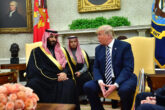June 04, 2020
How to Fix America’s Failing Sanctions Policy
In his landmark 1921 book “The Command of the Air,” the Italian military theorist Giulio Douhet argued that the advent of airpower would dramatically alter the nature of war. Until that point in history, the spatial limitations of ground and sea combat meant that “it was impossible to invade the enemy’s territory without first breaking through his defensive lines.” But Douhet perceived that this fundamental constraint no longer applied. “[F]or now it is possible to go far behind the fortified lines of defense without first breaking through them,” Douhet explained. “It is air power which makes this possible.”
The upshot of Douhet’s analysis—that the distinction between the battlefront and the home front had disintegrated—was terrifying. Yet Douhet saw in it reason for hope. If a country could attain unchallenged command of the air, it could launch a rapid assault against the industrial plant and infrastructure of its adversary, destroying the people’s will to resist. Gone would be lengthy, mass-casualty wars of attrition like World War I. With command of the air, a country could achieve decisive victory quickly and at limited cost.
Read the full article in Lawfare.
More from CNAS
-
Middle East Security / Energy, Economics & Security
Trump Inks $600 Bn Deal In Saudi Arabia | Musk, Blackrock CEO Flank Trump In Gulf VisitIn today's episode of India Global, U.S. President Donald Trump secured a $600 billion commitment from Saudi Arabia on Tuesday to invest in the United States. NDTV's Gaurie Dw...
By Daniel Silverberg
-
Energy, Economics & Security / Technology & National Security
Tariffs and Tech: An Uncertain RecipeHigher tariffs could prompt American cloud companies to shift more of their capital investments abroad....
By Pablo Chavez
-
Trump Tariffs: How Will U.S. Plans Reshape the Global Economy?
Donald Trump says he's already decided the tariffs he will impose on countries that export goods to America, including the United Kingdom. Channel 4 hears from Emily Kilcrease...
By Emily Kilcrease
-
Edward Fishman on the Age of Economic Warfare
In the latest episode of the Sanctions Space Podcast, Justine is joined by Edward Fishman, author of Chokepoints: American Power in the Age of Economic Warfare and an adjunct ...
By Edward Fishman




